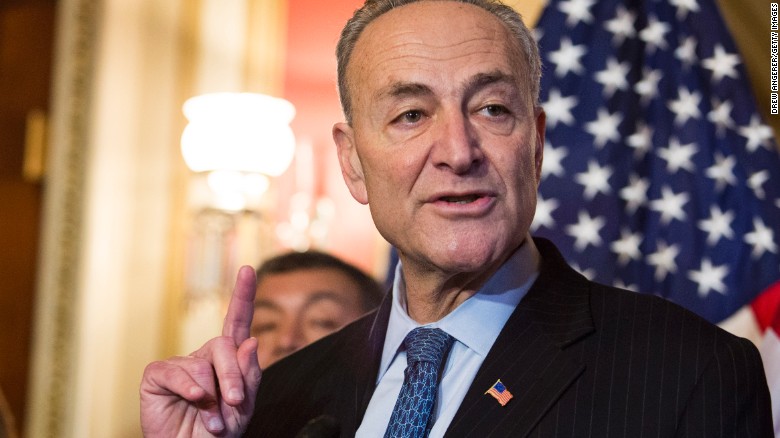Here’s a look at the life of Chuck Schumer, the US Senate minority leader and Democratic senator from New York.
Personal
Birth date: November 23, 1950
Birth place: Brooklyn, New York
Birth name: Charles Ellis Schumer
Father: Abe Schumer, exterminator
Mother: Selma (Rosen) Schumer
Marriage: Iris Weinshall (1980-present)
Children: Jessica, Alison
Education: Harvard University, A.B., 1971; Harvard Law School, J.D., 1974
Religion: Jewish
Other Facts
He was valedictorian at James Madison High School in Brooklyn and received a perfect 1600 score on the SAT test. He edited his high school newspaper, and at one point considered pursuing a career in chemistry. His parents encouraged him to go to medical school, but he opted for law school instead.
He funded his Harvard education by selling class rings while in school.
For more than three decades, Schumer shared an aging row house in Washington with Congressional colleagues, including Dick Durbin and George Miller. He lived in the row house during the week and returned to his family home in Brooklyn on weekends.
Writer/actress Amy Schumer is his second cousin, once removed.
Timeline
1975-1980 – New York State Assemblyman.
1981-1999 – US Representative from New York 9th District (formerly 10th District and 16th District).
1987-1988 – Sponsors the Fair Credit and Charge Card Disclosure Act, which requires credit card companies to list detailed information about fees and interest rates when soliciting new customers. The credit card disclosures are nicknamed “Schumer Boxes.”
1993-1994 – Sponsors the Brady Handgun Violence Prevention Act, which requires background checks and a five-day waiting period for handgun purchases. Sponsors the Religious Freedom Restoration Act, meant to prevent the government from interfering with an individual’s right to express his or her faith. Also, co-sponsors the Violent Crime Control and Law Enforcement Act, a measure that provides funding to expand police departments, increases prison capacity and allows judges to impose longer sentences for violent crimes. The crime bill includes an assault weapons ban, prohibiting the sale of certain types of military-style semi-automatic rifles for ten years.
1998 – Wins election to US Senate.
2004 – Wins reelection to the US Senate.
2005-2008 – Chairs the Democratic Senatorial Campaign Committee.
2006-present – Vice chairs the US Senate’s Democratic Conference.
2007-2010 – Chairs and vice chairs the US Senate’s Joint Economic Committee.
2009 – Co-sponsors the Matthew Shepard and James Byrd Hate Crimes Prevention Act, broadening the definition of hate crimes to include acts of violence against individuals based on their actual or perceived gender, disability, sexual orientation or gender identity.
2009-present – Serves on the US Senate Committee on Rules and Administration.
2010 – Wins reelection to US Senate.
2011-present – Chairman of the US Senate’s Democratic Policy and Communications Committee.
2013 – Works on immigration reform as a member of the bipartisan “Gang of Eight.” The group’s bill, the Border Security, Economic Opportunity and Immigration Modernization Act of 2013, passes the Senate. The House, however, declines to vote on the package, which creates a pathway to citizenship for undocumented immigrants.
August 3, 2015 – Holds a joint press conference with his cousin, actress and comedian Amy Schumer, to announce gun control legislation promoting stricter state background check laws. The press conference takes place 11 days after a deadly mass shooting at a screening of Schumer’s comedy, “Trainwreck,” in Louisiana. Schumer’s bill, the Fix Gun Checks Act of 2016, stalls in the Senate.
August 6, 2015 – Expresses his opposition to the nuclear deal with Iran in a statement. He says that he is concerned about a 24-day delay for inspectors to access facilities and other limitations on inspections.
November 8, 2016 – Wins reelection to the US Senate.
November 16, 2016 – Senate Democrats choose Schumer to succeed Harry Reid as leader in the chamber.
January 3, 2017 – On his first day as Senate Minority Leader, Schumer tells CNN that Senate Democrats plan to hold President-elect Donald Trump accountable but will also work with him if he supports legislation that is true to the Democratic Party’s principles.
March 2, 2017 – Schumer calls on Attorney General Jeff Sessions to resign in the wake of a report that Sessions met with the Russian ambassador to the US during the presidential campaign, contradicting his testimony during his Senate confirmation hearing. Sessions does not resign but recuses himself from involvement in the investigation into alleged Russian meddling in the 2016 election.
September 6, 2017 – Schumer meets with Trump and other congressional leaders in the Oval Office. During the meeting, Trump agrees to endorse a plan to attach hurricane relief money to a three-month extension of the debt ceiling that was proposed by Schumer and House Minority Leader Nancy Pelosi.
January 19, 2018 – Schumer meets with Trump at the White House to discuss a deal that could avert a looming government shutdown. Schumer offers to increase military spending and fully fund border security measures in exchange for a pledge to protect beneficiaries of the Deferred Action on Childhood Arrivals program (DACA). Trump ultimately rejects the deal. The failed negotiations lead to a brief shutdown that White House officials label the “Schumer Shutdown.”
June 27, 2018 – Schumer introduces a bill, the Marijuana Freedom and Opportunity Act, that would decriminalize and regulate marijuana at the federal level.
November 11, 2018 – Schumer says that Democrats may combine a must-pass spending bill with a measure protecting the Robert Mueller special counsel investigation into Russian election meddling.
November 10, 2020 – Schumer is reelected as a Senate party leader, but the party holding the Senate majority won’t be determined until two runoff elections in Georgia take place in January.
>>>>
